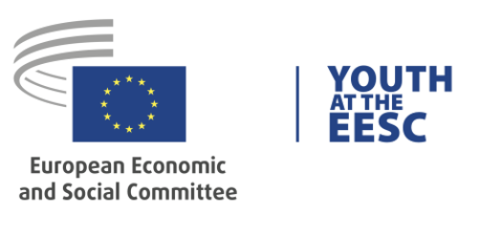European Economic
and Social Committee
Youth engagement at the EESC
For some years now, the EESC has been working on how to better integrate the voice of young Europeans in its work and in the EU decision-making process.
In April 2024, the EESC Bureau took a big leap forward in terms of meaningful and structured youth participation by approving the methodology to apply the 'EU Youth Test' at the EESC. The preparation for this methodology began in September 2022, when the EESC adopted the opinion The EU youth test, becoming the first EU institution committing to its implementation. The 'EU Youth Test' is a tool designed to strengthen youth participation and youth mainstreaming in policy-making based on consultation, impact assessment and mitigation measures. This methodology foresees youth representatives engaging with EESC members during the drafting of selected EESC opinions.
A pilot project took place during the preparation of the methodology to learn from experience of various ways to engage with youth organisations when drafting an opinion at the EESC. The sections/CCMI of the EESC selected one opinion each and successfully involved a total of 20 youth representatives. For example, the youngest ever advisor was appointed for the REX/580 opinion on EU-UK youth engagement, and the NAT/913 opinion on CAP post-2027 involved 5 youth representatives from 4 different youth organisations. The ECO/631 opinion on the European Semester cycle met with local youth organisations during country visits to 6 Member States. The experience of involving youth representatives in SOC/773 on the defence of democracy package, INT/1039 on the strategic foresight report, CCMI/216 on an initiative for virtual worlds, and TEN/830 on safeguarding democracy against disinformation also fed into the development of the 'EU Youth Test' at the EESC.
The methodology was prepared by the EESC Youth Group, which is also mandated to:
- Reflect on the best participatory mechanism to put in place to ensure that young people have the possibility to contribute to the work of the Committee and that there is space for dialogue between EESC members and external youth organisations.
- Coordinate the EESC's youth related initiatives.
- Strengthen the cooperation with external organisations.
The EESC has long been an advocate for meaningful youth participation. In September 2020, the EESC adopted the opinion Towards structured youth engagement on climate and sustainability in the EU decision-making process. The opinion was written in close cooperation with the European Youth Forum and Generation Climate Europe, and its main recommendations were:
- to establish the Youth Climate and Sustainability Round Tables, to be hosted by the EESC in cooperation with the European Commission;
- to include a youth delegate in the official EU delegation to UNFCCC COP meetings as well as in the delegation of the EESC, which holds observer status at such events;
- to include youth voices in EESC opinions relating to climate and sustainability, by proactively seeking input from youth representatives.
 In December 2021, in its dedicated opinion the EESC welcomed the proposal to designate 2022 the European Year of Youth. The Committee established a Coordination Group for the European Year of Youth in order to ensure the representation and visibility of this initiative within the EESC and to coordinate the ongoing youth-related initiatives. The Coordination Group received the mandate to strengthen cooperation with youth organisations and young people during and beyond the European Year of Youth and to cooperate with the other EU institutions and civil society organisations to ensure better cross-cutting integration of young people in their everyday activities.
In December 2021, in its dedicated opinion the EESC welcomed the proposal to designate 2022 the European Year of Youth. The Committee established a Coordination Group for the European Year of Youth in order to ensure the representation and visibility of this initiative within the EESC and to coordinate the ongoing youth-related initiatives. The Coordination Group received the mandate to strengthen cooperation with youth organisations and young people during and beyond the European Year of Youth and to cooperate with the other EU institutions and civil society organisations to ensure better cross-cutting integration of young people in their everyday activities.
In December 2022, the EESC adopted the resolution The long-lasting legacy of the European Year of Youth: youth mainstreaming and empowerment to ensure that the European Year of Youth will have meaningful impacts on the participation of young people in the EU decision making process.
Finally, the EESC also runs the youth event Your Europe, Your Say! (YEYS). Since 2010, the EESC's flagship communication event brings together 16- to 18-year-old pupils and their teachers from all EU Member States and candidate countries to connect with the European Union. Every year, more than 100 students come to Brussels for two days and work together to draft recommendations which are presented to the other EU institutions at the highest level. These recommendations contain their ideas, proposals and hopes for their future as European citizens.
